小学英语语法 介词和连词9
- 格式:doc
- 大小:301.50 KB
- 文档页数:5
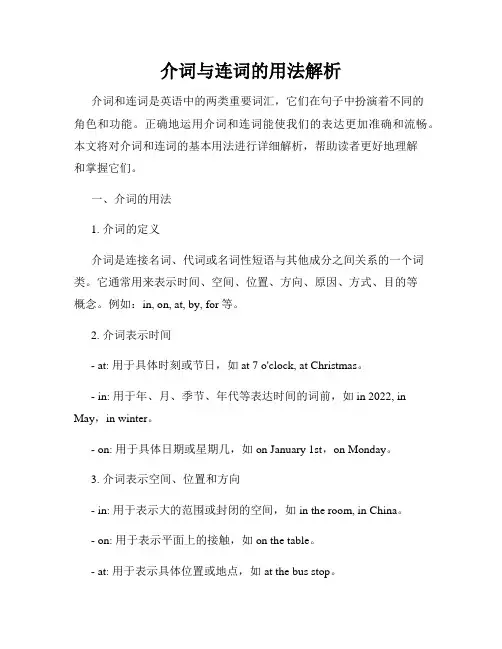
介词与连词的用法解析介词和连词是英语中的两类重要词汇,它们在句子中扮演着不同的角色和功能。
正确地运用介词和连词能使我们的表达更加准确和流畅。
本文将对介词和连词的基本用法进行详细解析,帮助读者更好地理解和掌握它们。
一、介词的用法1. 介词的定义介词是连接名词、代词或名词性短语与其他成分之间关系的一个词类。
它通常用来表示时间、空间、位置、方向、原因、方式、目的等概念。
例如:in, on, at, by, for等。
2. 介词表示时间- at: 用于具体时刻或节日,如at 7 o'clock, at Christmas。
- in: 用于年、月、季节、年代等表达时间的词前,如in 2022, in May,in winter。
- on: 用于具体日期或星期几,如on January 1st,on Monday。
3. 介词表示空间、位置和方向- in: 用于表示大的范围或封闭的空间,如in the room, in China。
- on: 用于表示平面上的接触,如on the table。
- at: 用于表示具体位置或地点,如at the bus stop。
4. 介词表示原因、方式和目的- for: 表示目的或原因,如for fun, for the sake of。
- by: 表示方式、方法或通过某种手段,如by bus, by email。
二、连词的用法1. 连词的定义连词是连接词语、短语或句子的词类。
它用于连接并列成分、并列句、主从句等,起到使句子结构更加完整和连贯的作用。
例如:and, but, or, so等。
2. 并列连词- and: 用于连接同类词、词组和句子,表示并列关系,如I like apples and oranges。
- but: 表示转折或对比关系,如She is smart but lazy。
- or: 表示选择关系,如Do you want tea or coffee?3. 从属连词- because: 引导原因状语从句,如I stayed at home because it was raining。
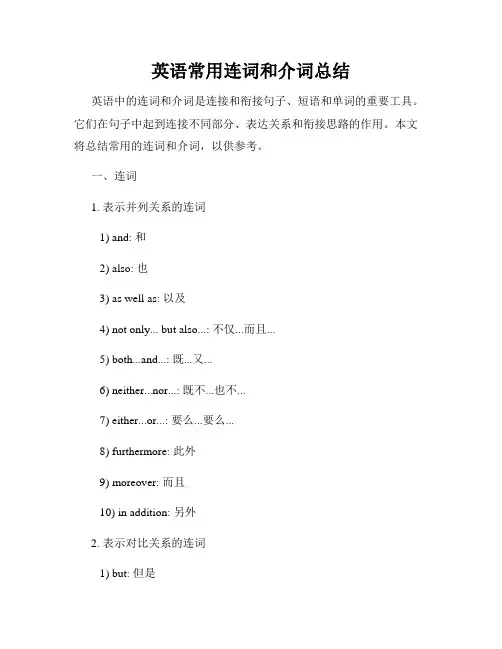
英语常用连词和介词总结英语中的连词和介词是连接和衔接句子、短语和单词的重要工具。
它们在句子中起到连接不同部分、表达关系和衔接思路的作用。
本文将总结常用的连词和介词,以供参考。
一、连词1. 表示并列关系的连词1) and: 和2) also: 也3) as well as: 以及4) not only... but also...: 不仅...而且...5) both...and...: 既...又...6) neither...nor...: 既不...也不...7) either...or...: 要么...要么...8) furthermore: 此外9) moreover: 而且10) in addition: 另外2. 表示对比关系的连词1) but: 但是3) on the other hand: 另一方面4) whereas: 然而5) while: 而3. 表示因果关系的连词1) because: 因为2) since: 既然3) as: 因为4) therefore: 因此5) thus: 因此6) so: 所以4. 表示条件关系的连词1) if: 如果2) unless: 除非3) provided/providing that: 假如/只要5. 表示让步关系的连词1) although: 尽管3) despite: 尽管4) in spite of: 尽管二、介词1. 表示位置关系的介词1) in: 在...内部2) on: 在...上面3) at: 在...旁边4) under: 在...下面5) above: 在...上面6) below: 在...下面7) beside: 在...旁边8) between: 在...之间9) among: 在...之中10) behind: 在...后面11) in front of: 在...前面2. 表示时间关系的介词1) at: 在...时刻2) on: 在...日期3) in: 在...时期3. 表示原因关系的介词1) because of: 因为2) due to: 因为3) owing to: 因为4. 表示方式和手段的介词1) by: 通过2) with: 以...方式3) through: 通过5. 表示目的和用途的介词1) for: 为了2) to: 为了6. 表示例证的介词1) for example: 例如2) such as: 例如7. 表示对比和区分的介词1) like: 像是2) unlike: 不像总结:介词和连词在英语中起到连接和衔接的作用,能够清晰地表达句子之间的关系和思路。

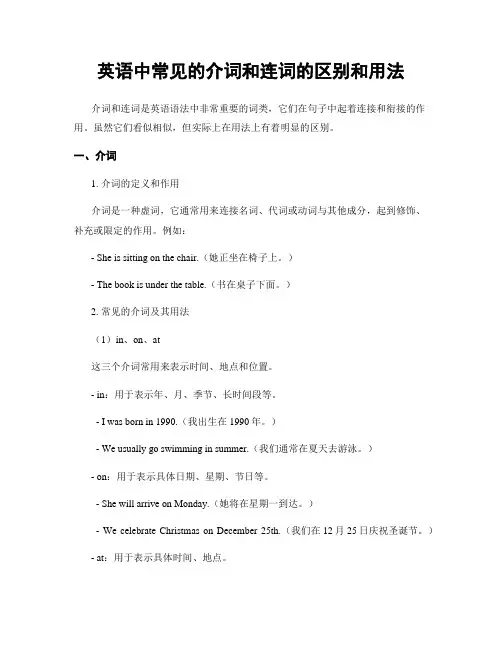
英语中常见的介词和连词的区别和用法介词和连词是英语语法中非常重要的词类,它们在句子中起着连接和衔接的作用。
虽然它们看似相似,但实际上在用法上有着明显的区别。
一、介词1. 介词的定义和作用介词是一种虚词,它通常用来连接名词、代词或动词与其他成分,起到修饰、补充或限定的作用。
例如:- She is sitting on the chair.(她正坐在椅子上。
)- The book is under the table.(书在桌子下面。
)2. 常见的介词及其用法(1)in、on、at这三个介词常用来表示时间、地点和位置。
- in:用于表示年、月、季节、长时间段等。
- I was born in 1990.(我出生在1990年。
)- We usually go swimming in summer.(我们通常在夏天去游泳。
)- on:用于表示具体日期、星期、节日等。
- She will arrive on Monday.(她将在星期一到达。
)- We celebrate Christmas on December 25th.(我们在12月25日庆祝圣诞节。
)- at:用于表示具体时间、地点。
- The meeting will start at 9 o'clock.(会议将在9点开始。
)- I met her at the library.(我在图书馆遇见了她。
)(2)with、without、by这三个介词常用来表示伴随、条件和方式。
- with:表示伴随、附带。
- She went to the party with her friends.(她和她的朋友们一起去了派对。
) - He always carries a book with him.(他总是随身带着一本书。
)- without:表示没有、不带。
- I can't live without you.(没有你我无法生活。
)- Please don't leave without saying goodbye.(请不要离开而不说再见。
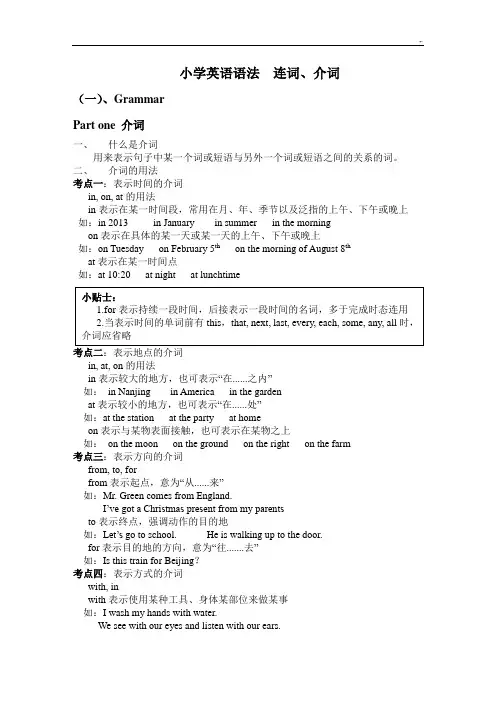
小学英语语法连词、介词(一)、GrammarPart one 介词一、什么是介词用来表示句子中某一个词或短语与另外一个词或短语之间的关系的词。
二、介词的用法考点一:表示时间的介词in, on, at的用法in表示在某一时间段,常用在月、年、季节以及泛指的上午、下午或晚上如:in 2013 in January in summer in the morningon表示在具体的某一天或某一天的上午、下午或晚上如:on Tuesday on February 5th on the morning of August 8that表示在某一时间点如:at 10:20 at night at lunchtime考点二:表示地点的介词in, at, on的用法in表示较大的地方,也可表示“在......之内”如:in Nanjing in America in the gardenat表示较小的地方,也可表示“在......处”如:at the station at the party at homeon表示与某物表面接触,也可表示在某物之上如:on the moon on the ground on the right on the farm考点三:表示方向的介词from, to, forfrom表示起点,意为“从......来”如:Mr. Green comes from England.I’ve got a Christmas present from my parentsto表示终点,强调动作的目的地如:Let’s go to school. He is walking up to the door.for表示目的地的方向,意为“往.......去”如:Is this train for Beijing?考点四:表示方式的介词with, inwith表示使用某种工具、身体某部位来做某事如:I wash my hands with water.We see with our eyes and listen with our ears.in表示使用某种语言如:Can you say it in English?一、填上合适的介词1. There is a supermarket _________ my house.2. Gao Shan is ______ duty today.3. Liu Tao often helps me ________ my study.4. My birthday is ________ October 21.5. There are lots of apples _______ the tree.6. I like reading and I can learn a lot ______ it.7. I can’t find the basketball. Maybe it’s ______ the door.8. I can buy some flowers _______ you.9. I get up ______ seven _______ the morning.10. Jack, please look _______ your things.二、根据中文提示,完成下列句子1. 墙上有许多标志。
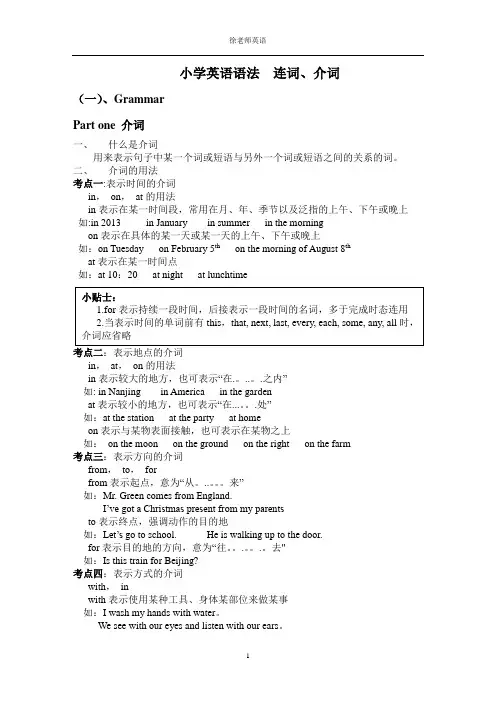
小学英语语法连词、介词(一)、GrammarPart one 介词一、什么是介词用来表示句子中某一个词或短语与另外一个词或短语之间的关系的词。
二、介词的用法考点一:表示时间的介词in,on,at的用法in表示在某一时间段,常用在月、年、季节以及泛指的上午、下午或晚上如:in 2013 in January in summer in the morningon表示在具体的某一天或某一天的上午、下午或晚上如:on Tuesday on February 5th on the morning of August 8that表示在某一时间点如:at 10:20 at night at lunchtime考点二:表示地点的介词in,at,on的用法in表示较大的地方,也可表示“在.。
..。
.之内”如: in Nanjing in America in the gardenat表示较小的地方,也可表示“在...。
.处”如:at the station at the party at homeon表示与某物表面接触,也可表示在某物之上如:on the moon on the ground on the right on the farm考点三:表示方向的介词from,to,forfrom表示起点,意为“从。
..。
来”如:Mr. Green comes from England.I’ve got a Christmas present from my parentsto表示终点,强调动作的目的地如:Let’s go to school. He is walking up to the door.for表示目的地的方向,意为“往。
.。
.。
去"如:Is this train for Beijing?考点四:表示方式的介词with,inwith表示使用某种工具、身体某部位来做某事如:I wash my hands with water。
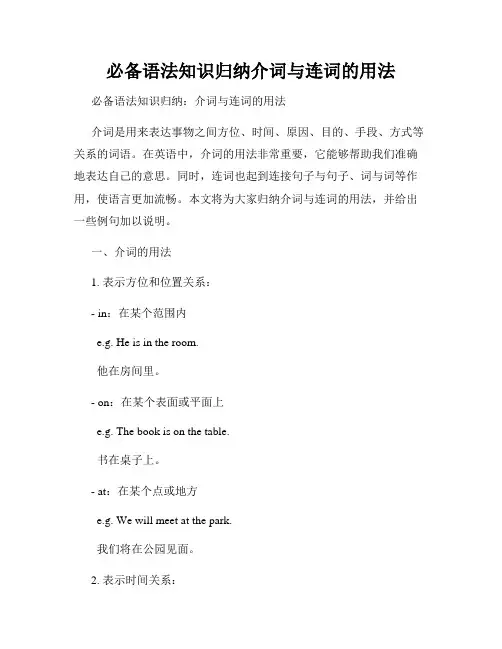
必备语法知识归纳介词与连词的用法必备语法知识归纳:介词与连词的用法介词是用来表达事物之间方位、时间、原因、目的、手段、方式等关系的词语。
在英语中,介词的用法非常重要,它能够帮助我们准确地表达自己的意思。
同时,连词也起到连接句子与句子、词与词等作用,使语言更加流畅。
本文将为大家归纳介词与连词的用法,并给出一些例句加以说明。
一、介词的用法1. 表示方位和位置关系:- in:在某个范围内e.g. He is in the room.他在房间里。
- on:在某个表面或平面上e.g. The book is on the table.书在桌子上。
- at:在某个点或地方e.g. We will meet at the park.我们将在公园见面。
2. 表示时间关系:- at:在某个具体时间点e.g. I will arrive at 8 o'clock.我将在8点钟到达。
- on:在某个具体日期或星期几e.g. My birthday is on February 14th.我的生日是在2月14日。
- in:在某个时间段或年份e.g. I will go on vacation in the summer.我会在夏天去度假。
3. 表示原因、目的、手段和方式:- for:表示目的e.g. I study hard for a better future.我努力学习是为了更好的未来。
- by:表示手段或方法e.g. I sent the letter by mail.我通过邮寄发送了信件。
- with:表示伴随或方式e.g. She walks with confidence.她步履自信地走着。
4. 表示从属或归属关系:- of:表示所属关系e.g. The book is the property of the library.这本书是图书馆的财产。
- to:表示从属关系e.g. He is a loyal servant to the king.他是国王的忠诚仆人。

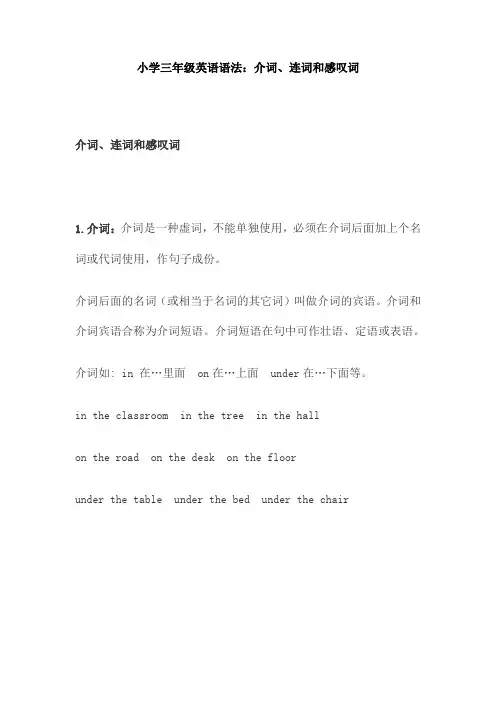
小学三年级英语语法:介词、连词和感叹词介词、连词和感叹词1.介词:介词是一种虚词,不能单独使用,必须在介词后面加上个名词或代词使用,作句子成份。
介词后面的名词(或相当于名词的其它词)叫做介词的宾语。
介词和介词宾语合称为介词短语。
介词短语在句中可作壮语、定语或表语。
介词如: in 在…里面on在…上面under在…下面等。
in the classroom in the tree in the hallon the road on the desk on the floorunder the table under the bed under the chair2.连词:连词是用来连接词与词、短语与短语、句子与句子等的词叫连词。
连词是一种虚词,在句子中不能单独作句子成分。
连词分两类:一类叫等立连词,另一类叫从属连词。
(1) 等立连词是用来连接同等的词、词组和分句的。
等立连词有许多,我们现在只学到了and和but,其他的以后学到再介绍。
如:A and B ; blue and white ;an apple and a banana; a car and a bus; Lucy and Ben ; Ben and Kitty ;This is a lorry and that's a drill.I like dolls and you like robots.(2) 从属连词是用来引起从句的、从属连词又分为引起名词性从句的连接词,如:if ,that 等。
引起壮语从句的连接词,如:when , after ,befare等。
以后会逐渐学到再介绍。
3.感叹词:表示说话人的某种感情(惊讶、高兴、痛苦等)的词叫感叹词。
感叹词后常用感叹号。
常用的感叹词有:oh(表示惊奇或痛苦),ah(表示惊奇或满意),hello(常被用来打招呼相当于汉语的“喂!”),well(表示惊讶,无奈)如:Hello.Are you Mary?练习:翻译下列词组1.在桌子上面2.在树下面3.在椅子上面4.在盒子里面5.在黑板上6.在书里7.在脸上8.在公共汽车上9.一只猫和一只狗. 10.又小又胖答案:1. on the desk2. under the tree3. on the desk4. in the box5. on the blackboard6. in the book7. on the face8. on the bus9. a cat and a dog 10. small and fat。
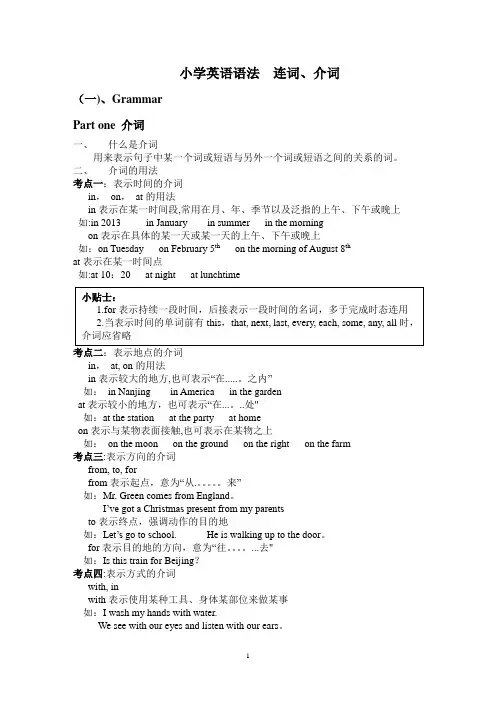
小学英语语法连词、介词(一)、GrammarPart one 介词一、什么是介词用来表示句子中某一个词或短语与另外一个词或短语之间的关系的词。
二、介词的用法考点一:表示时间的介词in,on,at的用法in表示在某一时间段,常用在月、年、季节以及泛指的上午、下午或晚上如:in 2013 in January in summer in the morningon表示在具体的某一天或某一天的上午、下午或晚上如:on Tuesday on February 5th on the morning of August 8that表示在某一时间点如:at 10:20 at night at lunchtime考点二:表示地点的介词in,at, on的用法in表示较大的地方,也可表示“在.....。
之内”如:in Nanjing in America in the gardenat表示较小的地方,也可表示“在...。
..处"如:at the station at the party at homeon表示与某物表面接触,也可表示在某物之上如:on the moon on the ground on the right on the farm考点三:表示方向的介词from, to, forfrom表示起点,意为“从.。
来”如:Mr. Green comes from England。
I’ve got a Christmas present from my parentsto表示终点,强调动作的目的地如:Let’s go to schoo l. He is walking up to the door。
for表示目的地的方向,意为“往。
...去"如:Is this train for Beijing?考点四:表示方式的介词with, inwith表示使用某种工具、身体某部位来做某事如:I wash my hands with water.We see with our eyes and listen with our ears。
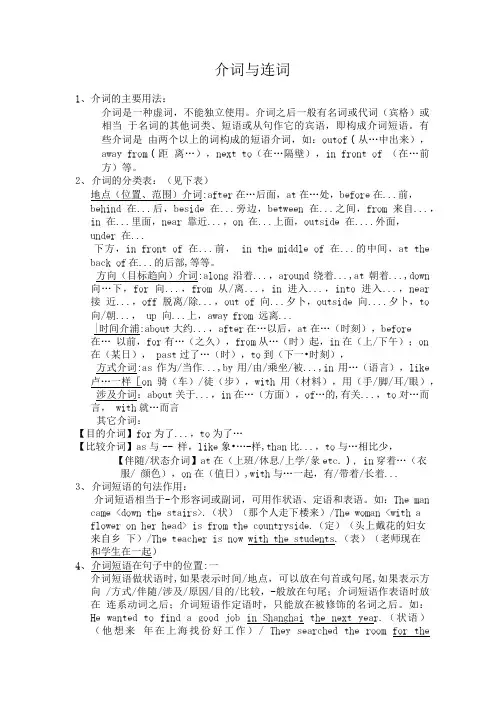
介词与连词1、介词的主要用法:介词是一种虚词,不能独立使用。
介词之后一般有名词或代词(宾格)或相当于名词的其他词类、短语或从句作它的宾语,即构成介词短语。
有些介词是由两个以上的词构成的短语介词,如:outof(从…中出来),away from(距离…),next to(在…隔壁),in front of (在…前方)等。
2、介词的分类表:(见下表)地点(位置、范围)介词:after在…后面,at在…处,before在...前,behind 在...后,beside 在...旁边,between 在...之间,from 来自...,in 在...里面,near 靠近...,on 在...上面,outside 在....外面,under 在...下方,in front of 在...前,in the middle of 在...的中间,at the back of在...的后部,等等。
方向(目标趋向)介词:along沿着...,around绕着...,at朝着...,down 向…下,for 向...,from 从/离...,in 进入...,into 进入...,near 接近...,off 脱离/除...,out of 向...夕卜,outside 向....夕卜,to 向/朝...,up 向...上,away from 远离...|时间介浦:about大约...,after在…以后,at在…(时刻),before在… 以前,for有…(之久),from从…(时)起,in在(上/下午);on 在(某日),past过了…(时),to到(下一•时刻),方式介词:as作为/当作...,by用/由/乘坐/被...,in用…(语言),like 卢…一样[on骑(车)/徒(步),with用(材料),用(手/脚/耳/眼),涉及介词:about关于...,in在…(方面),of…的,有关...,to对…而言,with就…而言其它介词:【目的介词】for为了...,to为了…【比较介词】as与-- 样,like象•…-样,than比...,to与…相比少,【伴随/状态介词】at在(上班/休息/上学/彖etc.), in穿着…(衣服/ 颜色),on在(值日),with与…一起,有/带着/长着...3、介词短语的句法作用:介词短语相当于-个形容词或副词,可用作状语、定语和表语。
小学英语介词连词总结归纳对于小学生来说,学习英语是一项重要的任务。
掌握英语的基础知识对他们日后的学习和交流都非常有帮助。
在英语中,介词和连词是两个重要的语法要素。
本文将对小学英语中的介词和连词进行总结归纳,帮助小学生更好地理解和运用它们。
一、介词介词是用来表示名词、代词或动词与其他词之间的关系。
常见的介词有以下几个:1. in(在):表示地点、时间或状态。
例句:I live in Shanghai.(我住在上海。
)He was born in 1998.(他出生于1998年。
)2. on(在…上):表示接触或依靠。
例句:Put the book on the table.(把书放在桌子上。
)She is sitting on the chair.(她正坐在椅子上。
)3. at(在…处):表示地点或时间。
例句:We meet at the park.(我们在公园见面。
)The party starts at 7 p.m.(晚上7点开始聚会。
)4. with(和…一起):表示伴随。
例句:I went shopping with my mom.(我和妈妈一起去购物。
) She is playing with her friends.(她正在和朋友们玩。
)5. for(为…):表示目的或受益关系。
例句:I bought a gift for my sister.(我给我妹妹买了一份礼物。
) He is studying hard for his exam.(他为了考试正在努力学习。
)二、连词连词是用来连接词与词、句与句的词语。
常见的连词有以下几个:1. and(和):用于连接同类的词语或句子。
例句:I like apples and bananas.(我喜欢苹果和香蕉。
)John sang a song and danced.(约翰唱歌跳舞。
)2. but(但是):表示转折或对比关系。
例句:She is smart but lazy.(她聪明但是懒惰。
小学英语语法连词、介词(一)、GrammarPart one 介词一、什么是介词用来表示句子中某一个词或短语与另外一个词或短语之间的关系的词。
二、介词的用法考点一:表示时间的介词in, on,at的用法in表示在某一时间段,常用在月、年、季节以及泛指的上午、下午或晚上如:in 2013 in January in summer in the morningon表示在具体的某一天或某一天的上午、下午或晚上如:on Tuesday on February 5th on the morning of August 8that表示在某一时间点如:at 10:20 at night at lunchtime考点二:表示地点的介词in,at, on的用法in表示较大的地方,也可表示“在。
.。
之内"如:in Nanjing in America in the gardenat表示较小的地方,也可表示“在。
..。
处"如:at the station at the party at homeon表示与某物表面接触,也可表示在某物之上如:on the moon on the ground on the right on the farm考点三:表示方向的介词from, to,forfrom表示起点,意为“从。
.。
来”如:Mr. Green comes from England。
I’ve got a Christmas present from my parentsto表示终点,强调动作的目的地如:Let’s go to school. He is walking up to the door.for表示目的地的方向,意为“往。
.。
去”如:Is this train for Beijing?考点四:表示方式的介词with,inwith表示使用某种工具、身体某部位来做某事如:I wash my hands with water。
小学英语语法连词、介词(一)、GrammarPart one 介词一、什么是介词用来表示句子中某一个词或短语与另外一个词或短语之间的关系的词。
二、介词的用法考点一:表示时间的介词in, on, at的用法in表示在某一时间段,常用在月、年、季节以及泛指的上午、下午或晚上如:in 2013 in January in summer in the morningon表示在具体的某一天或某一天的上午、下午或晚上如:on Tuesday on February 5th on the morning of August 8that表示在某一时间点如:at 10:20 at night at lunchtime考点二:表示地点的介词in, at, on的用法in表示较大的地方,也可表示“在......之内”如:in Nanjing in America in the gardenat表示较小的地方,也可表示“在......处”如:at the station at the party at homeon表示与某物表面接触,也可表示在某物之上如:on the moon on the ground on the right on the farm考点三:表示方向的介词from, to, forfrom表示起点,意为“从......来”如:Mr. Green comes from England.I’ve got a Christmas present from my parentsto表示终点,强调动作的目的地如:Let’s go to school. He is walking up to the door.for表示目的地的方向,意为“往.......去”如:Is this train for Beijing?考点四:表示方式的介词with, inwith表示使用某种工具、身体某部位来做某事如:I wash my hands with water.We see with our eyes and listen with our ears.in表示使用某种语言如:Can you say it in English?一、填上合适的介词1. There is a supermarket _________ my house.2. Gao Shan is ______ duty today.3. Liu Tao often helps me ________ my study.4. My birthday is ________ October 21.5. There are lots of apples _______ the tree.6. I like reading and I can learn a lot ______ it.7. I can’t find the basketball. Maybe it’s ______ the door.8. I can buy some flowers _______ you.9. I get up ______ seven _______ the morning.10. Jack, please look _______ your things.二、根据中文提示,完成下列句子1. 墙上有许多标志。
介词和连词的用法介词和连词是英语中非常重要的词类,它们在句子中起着连接和关联的作用。
正确使用介词和连词可以使句子更加准确和连贯。
本文将详细介绍介词和连词的用法,并给出一些例句来帮助理解。
一、介词的用法1. 表示位置关系:介词 "in" 通常用来表示某物在一个封闭的区域内,如 "in the house"(在屋子里)。
而 "on" 用来表示某物在一个平面的表面上,如"on the table"(在桌子上)。
示例:- The cat is in the box.(猫在盒子里。
)- The book is on the desk.(书在桌子上。
)2. 表示时间关系:介词"at" 通常用来表示具体的时刻,如"at 7 o'clock"(在7点)。
而 "on" 通常用来表示具体的日期,如 "on Monday"(在星期一)。
示例:- I will meet you at the airport at 9 am.(我会在早上9点在机场见你。
)- We are going to have a party on New Year's Day.(我们要在元旦举办一个派对。
)3. 表示原因和目的:介词 "for" 通常用来表示目的或目标,如 "for studying"(为了学习)。
而 "because of" 用来表示原因或由于某个原因,如 "because ofthe rain"(因为下雨)。
示例:- I bought a new dress for the party.(我为了派对买了一件新裙子。
) - The match was canceled because of bad weather.(比赛因为天气不好被取消了。
人教版六年级上册知识点归纳介词与连词的用法总结在人教版六年级上册中,介词和连词是语法学习的重要内容。
介词作为一种虚词,用来连接名词、代词或动词短语等,表达它们之间的关系;连词则主要用来连接词语、短语、从句等,使句子结构更加完整。
本文将对六年级上册中介词与连词的用法进行总结。
一、介词的用法1. 表示位置或方向介词"at"用于表示具体的位置,例如:at school(在学校)、at home (在家);介词"in"用于表示较大的地点范围,例如:in the city(在城市里)、in the park(在公园里);介词"on"用于表示具体的平面位置,例如:on the table(在桌子上)、on the floor(在地板上)。
2. 表示时间介词"at"用于表示具体的时刻,例如:at six o'clock(在六点钟)、at midnight(在午夜);介词"in"用于表示较长的时间段,例如:in the morning(在早上)、in the summer(在夏天);介词"on"用于表示具体的日期或星期几,例如:on Monday(在星期一)、on Christmas day(在圣诞节)。
3. 表示原因、目的或方式介词"for"用于表示目的或原因,例如:for fun(为了娱乐)、for breakfast(作为早餐);介词"to"用于表示方向或目的地,例如:go to school(去学校)、come to my house(来我家);介词"by"用于表示方式或交通工具,例如:by bus(乘坐公交车)、travel by plane(坐飞机旅行)。
二、连词的用法1. 并列连词并列连词的作用是连接并列的词语或句子,其中最常见的连词包括:"and"(和)、"but"(但是)、"or"(或者)。
小学英语介词和连词讲解编辑整理:尊敬的读者朋友们:这里是精品文档编辑中心,本文档内容是由我和我的同事精心编辑整理后发布的,发布之前我们对文中内容进行仔细校对,但是难免会有疏漏的地方,但是任然希望(小学英语介词和连词讲解)的内容能够给您的工作和学习带来便利。
同时也真诚的希望收到您的建议和反馈,这将是我们进步的源泉,前进的动力。
本文可编辑可修改,如果觉得对您有帮助请收藏以便随时查阅,最后祝您生活愉快业绩进步,以下为小学英语介词和连词讲解的全部内容。
介词:prep.表时间的介词口诀:年月季节前用in,日期星期要用on,几月几号也用on,上下午晚上又是in,若是某天上下午,要用on来,不用in。
this/ that/ next/ last/every前不加介.今那天下一上一at 时间真具体,正午午夜到黎明.noon night dawn例子:in on at /1. ___this morning2. _in__20133. _in__summer 4。
_in__May5. _in__the morning6. _on__Sundays7. _on_ June, 4th8. _on_the morning of July, 26th9。
_at_7:30pm 10。
_at__dawn11。
_/__ next week12. _/_that year地点介词:at---在小地点 at schoolin-—-在大地点或静止的地点in Beijingon———在露天或平面的场所on the farmon the Ti’anmen Squareon the playground方位介词:9个in on under behind in front of在前面between next to near aroundin the front of 在前部in在境内 on接壤 to 不相邻表方位China is __on__the north of North Korea. Guangzhou is _in__the south of China . America is __to_ the east of China。
腾飞辅导中心小学英语语法(第22期)第四讲介词和连词Name Mark ★重点讲解一、介词的用法(一)时间介词(1)at①表示具体的时刻:at seven (o’clock )②表示人的年龄:at the age of eleven③表示一段时间,“在...... 期间”:at night (在夜里)at Christmas(在圣诞期间)④与结尾为festival的节日连用,如:at Spring Festival(2)in:表示一段时间,常与月份和季节连用,也可用在习惯用语中。
如:in spring in January in February in the morning (3)on:表示具体的某一天,常与day和表示星期、节日的词连用。
如:on October the tenth on Christmas Eve on Christmas Dayon a cold day on Wednes day on Tree Planting Day (4)before 和after:表示时间的先后顺序。
如:They have to finish the work before Thursday.The boys often play football after dinner.We sometimes take a walk after supper.(5)from ... to ...:“从...... 到......”。
如:We have classes from Monday to Friday.She worked in the garden from morning to evening.This train is from Beijing to Tianjin.(二)方位介词(1)on :“在..... 上面” ,两物体有接触。
(2)over:“在..... 正上方” ,两物体没有接触。
如:A lamp is over the table. (灯和桌面没有接触)(3)above :“在..... 斜上方” ,两物体没有接触。
如:The plane is flying above the clouds. (飞机在云层中飞行)(4)under 和below:在..... 下面,两物体有接触。
①under :“在...... 的正下方” 。
如:There is a cat under the table.②below:“在...... 的下面”,不强调是否在正下方。
如:Our classroom is below theirs. (我们的教室在他们教室的下面)(5)in:“在...... 里面或者在 ...... 地方(大地点)” 。
如:in the drawer in the box in the room in the zooA group of visitors arrived in Beijing yesterday. (一群游人昨天抵达了北京)(6)at:“在...... 旁边或者在...... 地方(小地点)” 。
如:The family is eating at the table.(一家人正坐在桌子旁吃饭)I met Peter at the railway station.(7)behind:“在...... 后面” 。
如:Sally hid herself behind a tree.in front of“在... 外部的... 前面” 。
如:There is an apple tree in front of the houseThere is a house behind the apple tree.in the front of “在... 内部的... 前面” 。
如:There is a blackboard in the front of the classroom.(8)between:“在两者之间” 。
如:The office building is between the swimming pool and the playing ground. (三)动向介词(1)across :“横穿”,常与street ,bridge等名词连用。
如:Go across the street, and you will find a book shop.(2)though:“从....... 里面穿过” 。
如:We walked through the woods. (森林)(3)along :“沿着...... ”,常与road ,street ,river等名词连用。
如:Dick and Wendy walked along the river.Go along the road, and then turn left.(四)表示方式、手段的介词(1)by:表示“靠...... ;用......” 。
如:by bus by painting(靠画画为生)(2)with:表示“使用...... ” 。
如:We write with a pen. with our right hands with knives and forks (用刀和叉)(3)in:“用....... 语言” 。
如:We talked in English.(五)其它介词的用法(1)for①表示目的、对象,意思为“为......” 。
如:I have a gift for you. (给你)②表示原因,意思为“因为” 。
如:Thank you for your dinner. (感谢你的款待)I am sorry for being late. (对不起,我来晚了。
)(2)about:表示某种事物的内容,意思是“关于” 。
如:The movie is about the history of China. (这是一本关于中国历史的书)(3)with :①表示“和...... 一起” 。
如:Can you play with me? (你能跟我一起玩吗?)I did some cleaning with my mother at weekends. (周末我和妈妈一起做清洁)②表示“对于...... ” 。
如:I am very strict with my students. (be strict with ...对某人严格要求)③表示人或物具有的性质或特点,意思是“带着、带有” 。
如:The girl with red hair is my sister. (红头发的女孩是我妹妹)a woman with sunglasses(带着太阳镜的妇女)Our teacher came into the classroom with some flowers in her hand.(4)in:表示“穿着,带着” 。
如:The boy in blue is my brother.a boy in a white shirt a boy in a black hat(5)like:“像......” 。
如:John is like his father.John looks like an actor. (约翰看起来像一位演员)(6)of:表示所属关系,意思是“......的” (名词所有格)。
二、连词连词:是用来连接两个词或句子的词。
1.and: 和、还有,表示叠加关系。
Jimmy and me are classmates.2.or:还是,表示选择关系。
Which do you like, panda or monkey?3.but:但是,表示转折关系。
I like football, but I like basketball more.4.when:当......时,用来连接两个句子。
I was sad when I saw the broken tree.5.while:当......时,用来连接两个句子。
My mum is watching TV while I am doing homework.6.before:在.....之前,Sally went away before I came back.7.after:在......之后,I watch TV after I finish my homework.8.because:因为......,表示原因。
She is not here, because she’s ill.9.so:所以、那么......,表示结果。
He works very hard, so he gets 100.10.if:如果,表示条件假设。
I will go to the moon if I can fly.★做中学一、单项选择( ) 1.______ the afternoon of May, we visited the old man.A. OnB. AtC. In( ) 2.He left home _______ a cold winter evening.A. atB. onC. in( ) 3.Shanghai is _______ the east of China.A. inB. onC. to( ) 4.________ my father’s help, I have finished my composition.A. UnderB. OnC. with( ) 5.I really can’t agree _______ you.A. toB. onC. with( ) 6.How about ________ the flowers now?A. wateringB. are wateringC. watered( ) 7.What will you have ________ breakfast this morning?A. withB. forC. by( ) 8.A plane is flying ________ the city.A. onB. overC. above( ) 9.You are free to speak _______ the meeting.A. atB. inC. on( ) 10.Mr. Green stayed in China _______ Friday.A. toB. onC. till( ) 11.I won’t ask about it,I’m going to see it ____ _ my own eyes.A. byB. forC. with( ) 12.We go to school every day _ ______ Sunday.A. exceptB. withoutC. on( ) 13.There is a small river ___ the two townsA. inB. betweenC. among( ) 14.Are you going to the zoo __ __ _ bus or ___ my car?A. on; byB. by; inC. on; in( ) 15. We traveled overnight to Paris and arrived _______ 5 o’clock ______ the morning.A. on; inB. at; inC. at; onD. in; on( ) 16.There is many apples ___ the tree. A bird ___ the tree is picking an apple.A. in; onB. on; inC. in; at二、从方框中选择正确的连词填空。